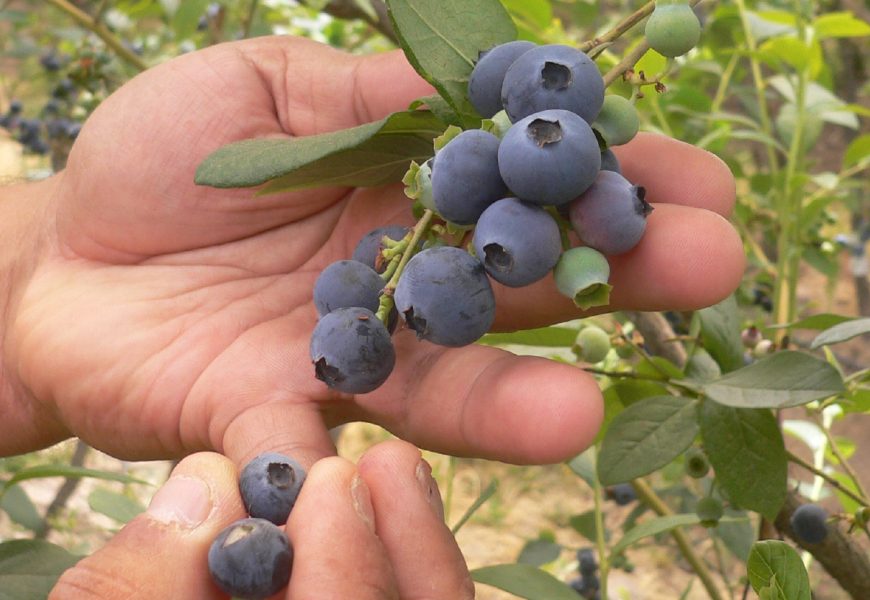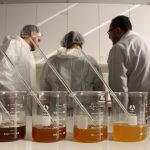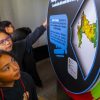A mobile device that improves fruit selection efficiency was developed by the Field Robotics Laboratory, of UdeC’s Faculty of Agricultural Engineering, led by Professor Christian Correa Ph.D. Its patent was licensed to a technology company created by alumni, Alan Vera and Fernando Bolaño, who have been part of the project since its inception.
By Roberto Fernández Ruiz / robertofr@gmail.com / Photographs: Trion
and Roberto Fernández
One of the difficulties the blueberry industry faces, is determining the effects of frosts, bruising, and other events in the fruit, which can affect its firmness and, as a result, lead to its rejection on the international markets.
In this context, a team from the Field Robotics Laboratory at the Universidad de Concepción’s Faculty of Agricultural Engineering (FIAUdeC), led by Christian Correa Farias Ph.D., developed an
innovative portable device to measure the firmness and internal structure of blueberries and other berries, which was patented in 2018 and licensed, in 2020, to the company Trion Soluciones de Ingeniería SpA, for its commercial scaling.
The specialist explained that “it was a response to a need we detected in the industry”, as damage to fruit cannot be detected at first glance.
“No company was willing to invest in the idea because, in general, they preferred for us develop other higher priority projects. But, considering that they said this was a need, we decided to do it as a laboratory, investing our resources and time. We ran tests over two seasons until we developed a very promising prototype that we then presented for funding. Once awarded, this let us move from the prototype to a viable minimum product, which we patented and licensed with the support of OTL. Now, it is on its way to making its first sales”, he told us.
Innovative product
The device allows quickly and accurately measuring given parameters, using images and a strength-deformation analysis on the fruit, principles that are directly applicable to other fruit of
interest for the market. Professor Correa highlighted that one of the advantages of the device is its portability, which allows making decisions onsite. “Currently, people go out into the field, take fruit samples, which they take to a laboratory in its packing, where firmness analysis is run. Sadly, they can only analyze a very limited sample, which is rarely representative. Also, the instruments used are not designed for small fruit”.
“We have generated a protocol that lets us run the analysis in under 5 seconds, meaning we can analyze a lot more samples, increasing representation, and providing a trustworthy value, especially considering that the error rates of portable equipment on the market is around 30%, while ours is under 1%, making this a groundbreaking device in this area”.
Trion
Trion was created in 2018 by Faculty alumni and members of the Robotics Laboratory: the agricultural and civil engineer, Alan Vera Muñoz, and the agro-industrial engineer Fernando
Bolaño Pacheco, who have been part of the project from the start.
Fernando Bolaño, who, alongside Alan Vera, joined the Laboratory from the beginning, recalled that the idea emerged from a concern the team had while working on a project to determine fruit
quality onsite, when he was doing his Master’s in Agricultural Engineering. “It was really interesting because the main quality parameter was not being adequately measured and there was no interest in improving it. However, we felt firmness was important”, the professional said.
The entrepreneur indicated that industrial scaling is next, which is why improvements have been made in its design. “It’s not enough to have a technically well-developed product. You also have to care about the design and many of the things the user demands, for example, that it’s easy to carry and use”.
He revealed that they are in conversations with an international company, which is interested in marketing the product. He finished by saying that “We want to have the first batch of devices this
season so that the company can test it. They are interested in that the equipment is quick and easy to use, that it provides reliable data and that human error in measurements is eliminated”, he said.
More information: ccorrea@udec.cl
Last modified: 29 de agosto de 2025







